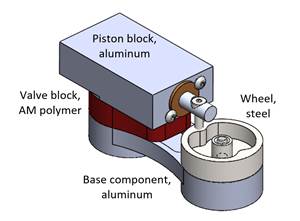Skill Standards Spawn Training
As technology in the metalforming industry becomes more sophisticated, customer expectations more demanding and quality system requirements more exacting, shopfloor employees are required to possess skills and knowledge far surpassing those of past generations. New training processes are necessary to replace old training paradigms.
Share





As technology in the metalforming industry becomes more sophisticated, customer expectations more demanding and quality system requirements more exacting, shopfloor employees are required to possess skills and knowledge far surpassing those of past generations. New training processes are necessary to replace old training paradigms.
Recognizing this, the Precision Metalforming Association (PMA) and several other metalworking trade associations have been working for several years to build, from the ground up, performance-based skill standards for the industry. With the need to drive training down to local and company levels, these standards have provided the basis for models that schools, companies and other training providers can emulate to increase the skill level of employees and potential employees.
These associations, including Association For Manufacturing Technology, National Tooling & Machining Association, Precision Machined Products Association and Tooling & Manufacturing Association, created a consortium in 1995, the National Institute for Metalworking Skills (NIMS), as a vehicle to support the development of a skilled industry workforce.
NIMS has four basic missions:
- It is responsible for developing, writing, validating and maintaining skill standards and performing a periodic review of each standard;
- It credentials the skill levels of individuals through performance and written assessments;
- It certifies training programs that train to the standards and meet NIMS quality requirements; and
- It assists states, schools and companies in forming partnerships to deliver training based on the skill standards.
The NIMS standards follow two paths, one for machining and one for metalforming. Each has Level I standards covering basic skills, followed by Level II and Level III standards for more advanced skills. NIMS credentials are designed to document competencies in both skills and knowledge necessary to perform to a specified level. Applicants must first progress through a standards-based performance assessment then pass a written knowledge exam.
For the metalforming industry, Level I standards consist of basic skills necessary for entry-level positions in any of the metalforming processes. Level II standards are typically operator skills, while Level III skills cover setup technicians. Training to Level I skills can be taught in a classroom environment, while Levels II and III require a combination of classroom and workplace on-the-job training.
The skill standards have spawned training initiatives on many levels. The PMA Educational Foundation has developed and is pilot testing a “turnkey” 65-hour curriculum to teach Metalforming Level I skills. This curriculum can be used in a school or plant setting as part of an apprenticeship, new-hire or current employee development system with structured on-the-job training. Similar curricula for Level II and III skills will follow.
As companies and schools are becoming more familiar with NIMS, use of the standards is growing. Led by Morgal Machine Tool Company, Inc. and Ohio Stamping & Machine, Inc, in Springfield, Ohio, there are now 15 companies with metalforming employees either credentialed or in the process of being credentialed. These companies find that skill standards allow an assessment of exactly how skilled each of their employees is. The NIMS standards also help the companies provide for consistency in training, support continuous improvement programs and pay-for-skills systems, and provide training documentation required by ISO/QS.
NIMS skill standards are also being used in partnerships between industry and education throughout the country to develop curriculum and deliver training. Several PMA local districts have developed training programs based on NIMS metalforming skill standards in cooperation with local educational institutions. In each case, the district organized an education committee of members to take the lead in developing the program. A committee’s leadership is essential to successfully meeting the needs of the industry as well as the trainees.
The training materials, assessments and models are available; implementation is the path to a well prepared workforce.
Related Content
Solve Worker Shortages With ACE Workforce Development
The America’s Cutting Edge (ACE) program is addressing the current shortage in trained and available workers by offering no-cost online and in-person training opportunities in CNC machining and metrology.
Read MoreInside Machineosaurus: Unique Job Shop with Dinosaur-Named CNC Machines, Four-Day Workweek & High-Precision Machining
Take a tour of Machineosaurus, a Massachusetts machine shop where every CNC machine is named after a dinosaur!
Read MoreThe Power of Practical Demonstrations and Projects
Practical work has served Bridgerland Technical College both in preparing its current students for manufacturing jobs and in appealing to new generations of potential machinists.
Read MoreFinding the Right Tools for a Turning Shop
Xcelicut is a startup shop that has grown thanks to the right machines, cutting tools, grants and other resources.
Read MoreRead Next
Setting Up the Building Blocks for a Digital Factory
Woodward Inc. spent over a year developing an API to connect machines to its digital factory. Caron Engineering’s MiConnect has cut most of this process while also granting the shop greater access to machine information.
Read MoreBuilding Out a Foundation for Student Machinists
Autodesk and Haas have teamed up to produce an introductory course for students that covers the basics of CAD, CAM and CNC while providing them with a portfolio part.
Read MoreRegistration Now Open for the Precision Machining Technology Show (PMTS) 2025
The precision machining industry’s premier event returns to Cleveland, OH, April 1-3.
Read More






























